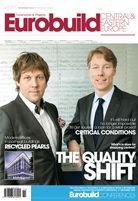What do tenants want? The question posed by Freud about women is one frequently asked by developers about end-users – and it is almost as vexing. Knowing how to keep tenants happy is the secret to a long and happy landlord-tenant relationship, and anything that keeps the romance alive can only be helpful. The good news, therefore, is that ‘Eurobuild CEE’ has commissioned a survey of end-users across Poland to find out what they like... and what can drive them apartRichard Stephens, ‘Eurobuild CEE’: What have you learnt from this survey?Magdalena Tulaja, analyst, Millward Brown : This survey was different because of the nature of the real estate market, where the opinion of tenants means big money for owners, and so reputations are extremely important. They really try to take care of their tenants and look after their income, which meant they were very conscious of us and sometimes not really willing to share information.Izabella Anuszewska, research unit director, Millw




























































